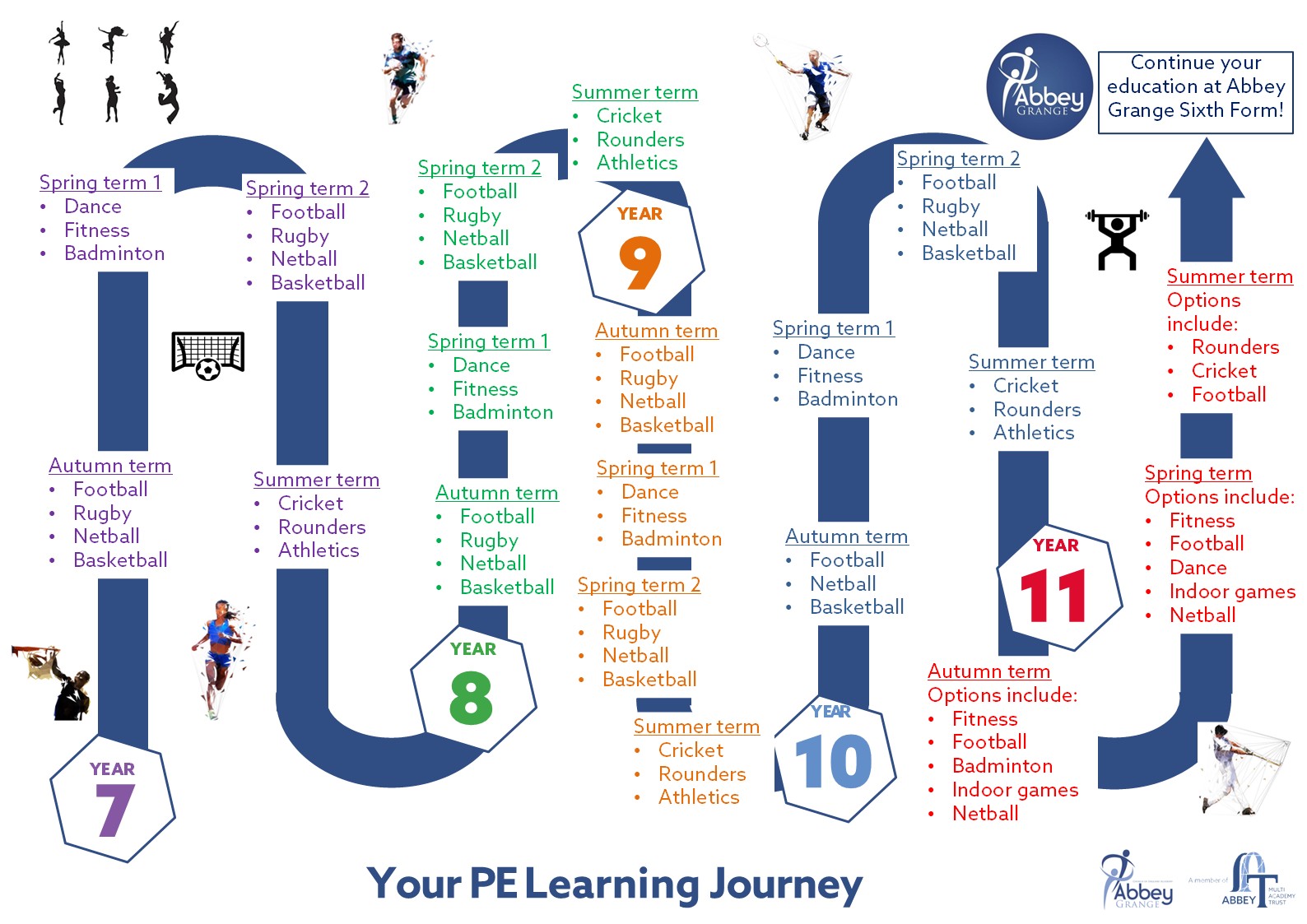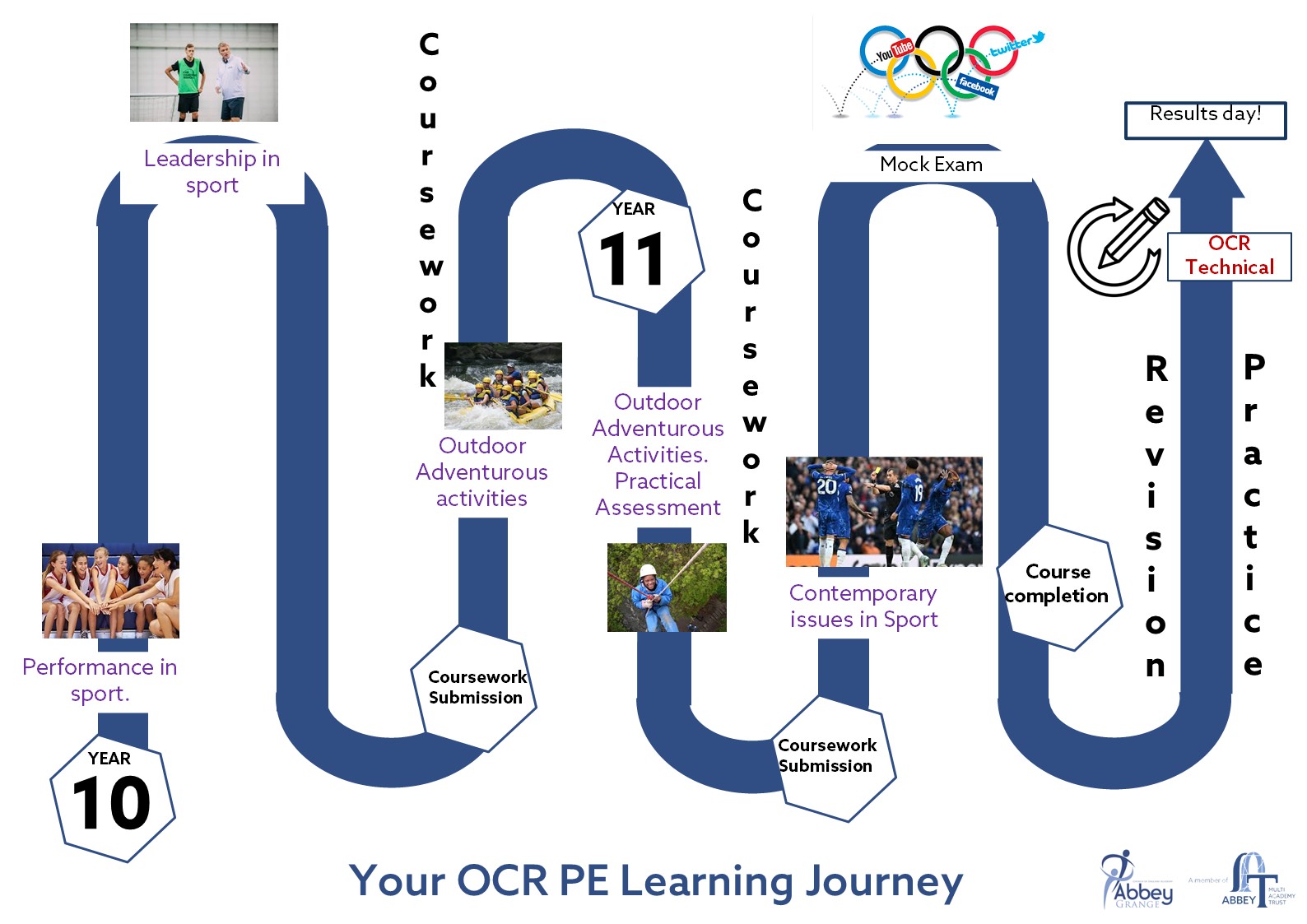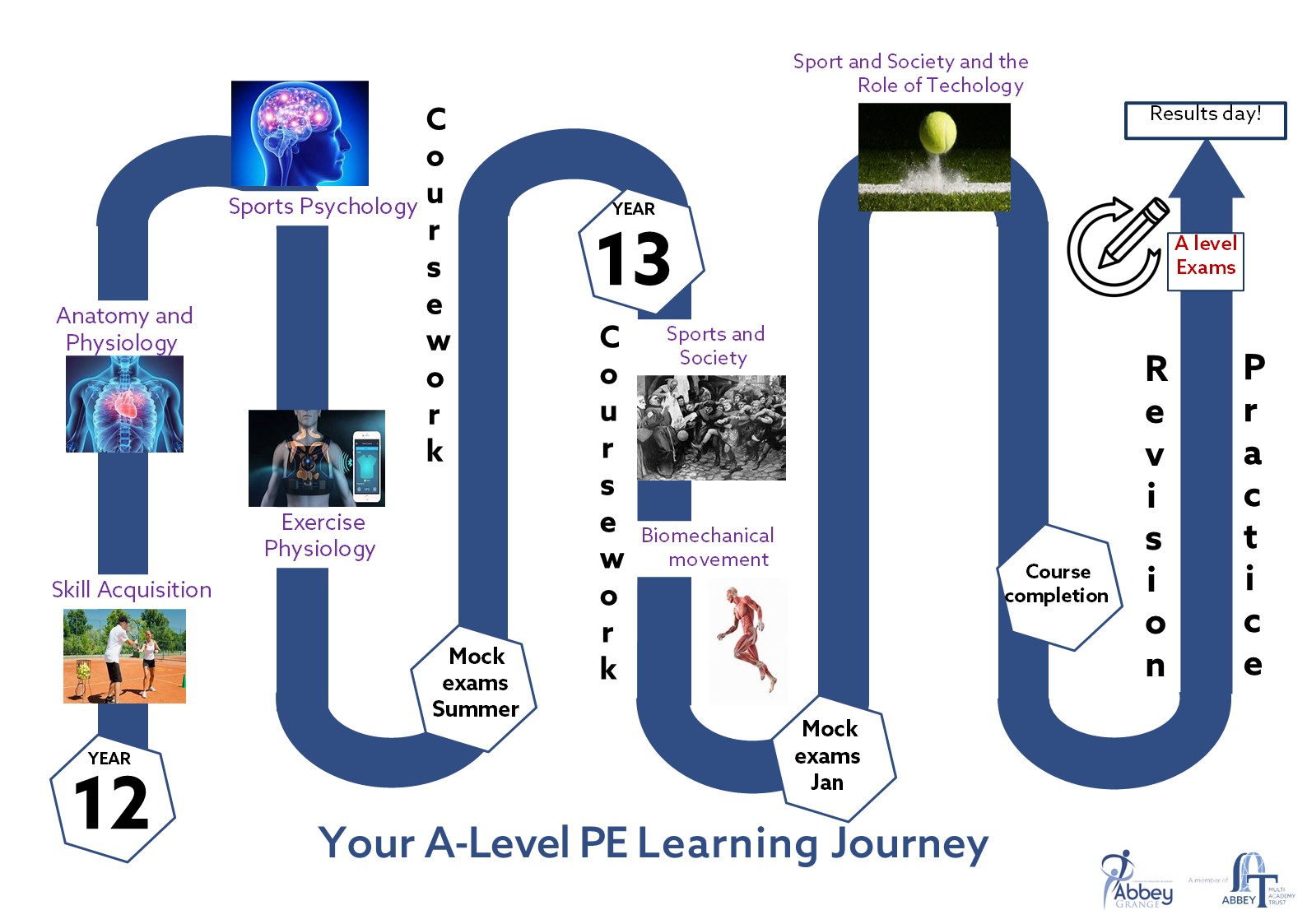
Our Physical Education curriculum nurtures a belief in all students’ abilities and cultivates a lifelong commitment to physical activity. Through our challenging, engaging, and inclusive curriculum we equip students with the knowledge, skills and confidence to become physically literate, resilient, and benevolent individuals who are equipped to lead healthy, active lives and contribute positively to their communities.

Pupils undertake a broad and balanced curriculum covering a range of different activity areas including athletics, badminton, cricket, fitness, football, dance, netball, rugby, rounders. and basketball.
The aims of the Physical Education is to develop pupils’ physical competence and knowledge of movement and safety and their ability to use these to perform in a wide range of activities associated with the development of an active and healthy lifestyle. It also develops in students, both as individuals and in groups or teams, confidence and generic skills, especially those of collaboration, communication, creativity, critical thinking and aesthetic appreciation. These, together with the nurturing of positive values and attitudes in PE, are foundations for students’ lifelong and life-wide learning and continued participation in physical activity.
PE plays a powerful role in developing Aspiration, Benevolence, Belief, Excellence and Youth Leadership not just through physical skill development but by shaping character, mindset, and social responsibility. These values are nurtured through PE by allowing pupils to work with others to demonstrate sportsmanship, develops their leadership, enables them to learn and interpret different rules and improves their fitness by engaging in physically demanding activities. The curriculum also helps to develop students' self-esteem and positive mental health by learning to deal with both the successes and failures which sport brings.
Physical Education, while seemingly focused on physical activity, offers a rich context for exploring profound questions about self-awareness, identity, discipline, relationships with others (teamwork, fairness), the appreciation of beauty in movement and the body, and, indirectly, even spiritual reflections on the human form and purpose.
Assessment takes place in every core PE lesson throughout KS3 against the Head, Heart, Hands lesson objectives. Pupils are assessed through teacher assessment, questioning and self or peer-assessment . At the end of an activity block, assessment of learning takes place to look at how much learning has occurred throughout that activity block, through final competitive application. Students will be assessed against the BRONZE, SILVER and GOLD criteria.
Which is assessed on the following
• Head - Knowledge and understanding of rules, tactics and strategies.
• Heart – Moral principles eg. teamwork and sportsmanship, resilience, effort
• Hands - Performance of basic skills
Studying GCSE PE offers a blend of practical and theoretical knowledge, providing a solid foundation for those interested in sports, fitness, and related fields. It allows students to develop their practical skills, enhance their understanding of the human body and its functions in relation to physical activity, and explore the socio-cultural aspects of sport.
All pupils in Key Stage 4 undertake Physical Education lessons as part of the curriculum.
Pupils will use the knowledge, skill and understanding gained at key stage 3 to participate in full context/ competitive situations. Pupils will take an increased responsibility for their own learning and actively demonstrate their skills and capabilities to organise and lead activities by taking on a variety of role including, performer, coach and official. They are encouraged to make informed and responsible choices about the role of physical activity in their lives both in and out of school.
PE plays a powerful role in developing Aspiration, Benevolence, Belief, Excellence and Youth Leadership not just through physical skill development but by shaping character, mindset, and social responsibility. These values are nurtured through PE by allowing pupils to work with others to demonstrate sportsmanship, develops their leadership, enables them to learn and interpret different rules and improves their fitness by engaging in physically demanding activities. The curriculum also helps to develop students' self-esteem and positive mental health by learning to deal with both the successes and failures which sport brings.
Physical Education, while seemingly focused on physical activity, offers a rich context for exploring profound questions about self-awareness, identity, discipline, relationships with others (teamwork, fairness), the appreciation of beauty in movement and the body, and, indirectly, even spiritual reflections on the human form and purpose.
Rewards will be given on classcharts for knowledge and understanding of rules and tactics, performance of skills in competitive situations and moral principles.
Taking an AQA A-level in PE offers a blend of theoretical and practical learning, providing a strong foundation for further studies in sports-related fields and developing valuable transferable skills applicable to various careers. It delves into the science, psychology and sociology of sports, alongside practical skill development.
------------------------------------------
In GCSE PE AQA, you will learn about the theoretical and practical aspects of physical education, including anatomy, physiology, movement analysis, training principles, sports psychology, and the socio-cultural influences on sport. You'll also develop your understanding of health, fitness, and well-being.

You will learn why people do or don’t take part in sport and understand the values promoted through sport and how big events like the Olympics impact society. You will learn why some athletes choose to and not to take performance enhancing drugs.
You will take part in two different sports and improve your own performance through a variety of reflection practices. You will learn how to plan and lead a sports activity session, then review how well you did.
You will learn about the different Outdoor Adventurous activities and the physical, mental and social benefits of these activities on a person. You will learn how to perform an OAA safely and be assessed within an OAA. You will learn how to review your performance once completed.

Pupils will demonstrate Aspiration through mastery of all topics, precise terminology, connecting concepts and critical thinking. Within lessons pupils will demonstrate benevolence in the classroom through their direct interactions with peers and their contributions to the overall classroom environment, they will be encouraged to show genuine kindness, care, and a desire for the well-being and success of others. Belief is fostered through students actively participating in lessons, attempting challenging tasks and having resilience to make mistakes. Excellence is demonstrated through intellectual curiosity and growth mindset, consistent effort, diligent work, proactive learning and high-quality output. Youth leadership is developed through working collaboratively and leading by example in their learning.
AQA GCSE PE and OCR CNAT, while focused on physical performance and socio-cultural aspects, implicitly encourages students to ponder profound questions about self-awareness, ethical interaction with others, the aesthetic appreciation of movement, and the intricate design of the human body.
Super six tasks are used to start most lessons to ensure pupils engage in learning as they arrive. A variety of questioning is used to challenge the range of abilities in assessment for and of learning. Pupils regularly have to apply their knowledge to questions and scenarios as a form of assessment in A and D tasks every fortnight (although longer, continuous prose responses are not assessed until the pupils have the knowledge and skills in place). Assessment of learning takes place half-termly at a suitable point for the cohort and the programme of study, also taking into account the progress report windows.
You will be assessed through two pieces of written course work which will be units R185 and R187. R185 is worth 40% of your grade and R187 is worth 20%. You will then complete a written exam R184 which is worth 40% of your overall grade.
Assessments will take place throughout year 10 with submission dates from April to May. You will then submit your second piece of coursework in year 11 which will be submitted in the January. You will then sit your exam in May of year 11.
Studying PE at Key Stage 4 can support you with studying A-Level PE and Cambridge Technical Extended Certificate in Sport Studies. PE can lead to careers such as physiotherapy, sports psychology, personal training and fitness coaching, teaching, sports journalism and sports management or event co-ordination.
The course is designed to give you a deep understanding of the science and psychology behind sport as well as practical performance and analysis. Pupils will develop their knowledge and understanding of the changes within the body systems and the adaptations that occur through training or lifestyle and how these changes affect the efficiency of those systems. Pupils will learn how skill is acquired and the impact of psychological factors on performance. Pupils will develop knowledge and understanding of the interaction between and the evolution of sport and society and the technological developments in physical activity and sport.

You will learn how the body works during exercise – including muscles, bones, the heart, and lungs and the impact sport has on these body systems. You will how to develop skills to coach and lead others in sport, including planning and delivering sessions. You will develop an understanding of how to respond to sporting injuries and how injuries happen, how to prevent them, and how athletes recover. This links directly into the biomechanics unit where you will learn how movement occurs within the body during sport. You will then learn how sport is managed in the UK – including funding, governing bodies, and development strategies.

Pupils will demonstrate Aspiration through mastery of all topics, precise terminology, connecting concepts and critical thinking. Within lessons pupils will demonstrate benevolence in the classroom through their direct interactions with peers and their contributions to the overall classroom environment, they will be encouraged to show genuine kindness, care, and a desire for the well-being and success of others. Belief is fostered through students actively participating in lessons, attempting challenging tasks and having resilience to make mistakes. Excellence is demonstrated through intellectual curiosity and growth mindset, consistent effort, diligent work, proactive learning and high-quality output. Youth leadership is developed through working collaboratively and leading by example in their learning.
AQA A-Level PE and CTEC Sport, through its in-depth exploration of performance, psychology, biomechanics, and socio-cultural issues, provides a sophisticated framework for students to critically examine questions of self-optimization, complex social dynamics and ethics, the aesthetic qualities of human movement, and, for some, the intricate design of the human body as a reflection of creation.
Super six tasks are used to start most lessons to ensure pupils engage in learning as they arrive. A variety of questioning is used to challenge the range of abilities in assessment for and of learning. Pupils regularly have to apply their knowledge to questions and scenarios as a form of assessment in A and D tasks every fortnight (although longer, continuous prose responses are not assessed until the pupils have the knowledge and skills in place). Assessment of learning takes place half-termly at a suitable point for the cohort and the programme of study, also taking into account the progress report windows.
You will be assessed mostly by coursework which is marked by the teacher and then sent off to the moderator during moderation season. Two units will be exam based and externally assessed through set tasks and timed exams. These include unit 1 anatomy and physiology and unit 3 sports organisation.
A-Level and Cambridge Technical Extended Certificate in Sport and lead to studying PE at university and lead to careers such as physiotherapy, sports psychology, personal training and fitness coaching, teaching, sports journalism and sports management or event co-ordination.